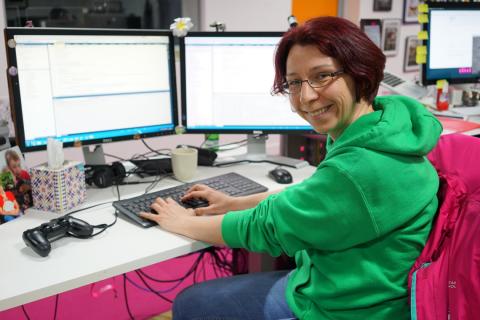
In the first part of our series exploring the many jobs you can do in games, we speak to Amy Phillips from game developers Media Molecule about her start in games and advice to young game designers!
How did you start working in the game industry?
I studied Maths, Physics and Computer Science at University, but wasn’t sure what job I wanted. Whilst working in the Cambridge Computer Lab as a Research Assistant I visited a friend who worked at Big Blue Box. He was called into the office because they were behind on a Fable milestone. I went with him and loved the friendly informal atmosphere and the people I met there, so sent my CV off to all the games companies I could find in Guildford. After many rejections and invitations to try again in 6 months or so, I got a job on a team of two porting Burnout 1 to GameCube.
What is your job role and what does it entail?
My job title is High Priestess of Online Code (Network Programmer), but my job has morphed a bit since having kids and going part time. Now, I do tools programming and network coding, and wherever I see a gap do something useful to fill it!
What is the first thing you do when starting work on a new game?
Prototype and iterate (make something quickly and keep changing it until you have something you’re happy with)! The best design document is a demo/video/previz (cut right down to the bare essentials), that you can put in front of someone and say, ‘It should work kinda like that!'
What makes a good game idea?
Something a bit different – at the moment I’m really interested in how you balance satisfying risk/reward without the obvious and way overused mechanic of shoot everything that moves!
What three tips would you give for Young Game Designers just beginning their application to the competition?
I’ve found that a game designer and a programmer sitting together, talking and iterating, as they implement a feature together works really well. Much better than a designer writing a doc and then a programmer implementing it – fast iteration is key!
Game jams are awesome – just spending the weekend making a game with your friends gives you loads of practice and you end up with something for your portfolio too.
Finish it! Finishing a game is hard – make sure something in your portfolio is ‘finished’ – you’ll learn a lot polishing it! And prospective employers will know that you can take on a job and complete it.

